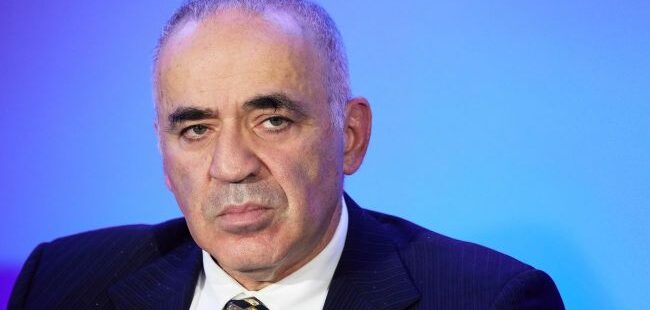

Garry Kasparov in a long interview with Rbc-Ukraine: The fall of the “mafia-type dictator” Vladimir Putin “will be inevitable after the liberation of Ukraine. The war cannot end while Putin is in power.
Putin’s downfall will be the result of Russia’shttps://t.co/BbRmR7grpi— Maria Esteves (@marlesteves) August 17, 2023
.@Kasparov63: “#Putin’s downfall will be the result of #Russia’s defeat in the war. Putin’s downfall will be inevitable after #Ukraine’s liberation, precisely because the regime will not last if the leader loses legitimacy.” https://t.co/eT7fblFEO0
— Francisco Taveira (@jftaveira1993) August 18, 2023
This article is a reprint. You can read the original at RBC-Ukraine.
By Uliana Bezpalko, Kateryna Danishevska
“Russian opposition figure Garry Kasparov discussed in an interview with RBC-Ukraine what prompted Putin to attack Ukraine, what the outcome of the war could be, and what future awaits Russia.
Garry Kasparov, the former world chess champion, has been in opposition to the Russian government for decades. After the start of the big war, he, along with like-minded individuals, created the Anti-War Committee and the Russian Action Committee, which brought together Putin’s opponents living abroad.
Our conversation took place via video call, with two flags in the background – blue and yellow, representing Ukraine, and white-blue-white, representing Russians protesting against the war, along with the inscription “Glory to Ukraine” in two languages – Ukrainian and Russian.
Kasparov went into forced exile back in 2013 when the Kremlin began tightening its grip, getting rid of dissenters, even physically. Since then, in his view, any opposition activity within Russia became a mere imitation, playing into the hands of the regime. Putin gained a convenient screen for the West while he solidified fascism in the country and prepared for full-scale aggression.
Even now, seeing the actions of the Kremlin regime, not all Russian opposition members unanimously agree that Putin must go and that Crimea is Ukraine’s territory, notes Kasparov. He is convinced that there is no other way to cleanse the Russian society’s mindset apart from raising the Ukrainian flag in Sevastopol.
Why Putin opted for aggression and war against Ukraine
In a calculated move, Putin has taken a path of aggression against Ukraine, according to Garry Kasparov. He believes that Putin had been planning this course of action for years. The initial alarm bells for Putin rang during Ukraine’s Orange Revolution, the first Maidan, where citizens rallied for change in government. The very idea of a neighboring state where people could peacefully challenge authority through protests posed a potential threat to Putin’s regime, Kasparov contends. He feared that Russians might follow the same path of dissent.
This concern drove Putin to strategize the annexation of Crimea and to outline plans for the capture of Ukraine’s eastern and southern regions, cutting off its access to the Black Sea – a project called “Novorossiya” (“New Russia”). Kasparov suggests that Putin intended to execute this territorial expansion following Ukraine’s presidential elections, slated for 2015.
“In 2015, elections were due, where Yanukovych would have likely lost to a pro-Western candidate, but he would have gained victory in the eastern and southern regions, as well as in Crimea. This is where the scheme for secession of these areas might have worked. However, the second Maidan disrupted these calculations. This compelled Putin to accelerate his plans. With Crimea, he succeeded due to the presence of a Russian military base. And at that time, the Ukrainian government wasn’t ready to counteract him,” elaborates the Russian oppositionist.
However, realizing this strategy in the eastern and southern regions of Ukraine didn’t go according to plan. The majority of the local population in these areas didn’t rally behind Igor Girkin (also known as Strelkov) and his associates. The failure of Putin’s initial blueprint prompted him to rethink his approach. The obliteration of Ukraine was, in many ways, regarded by Putin as an existential question tied to his regime’s survival, Kasparov asserts.
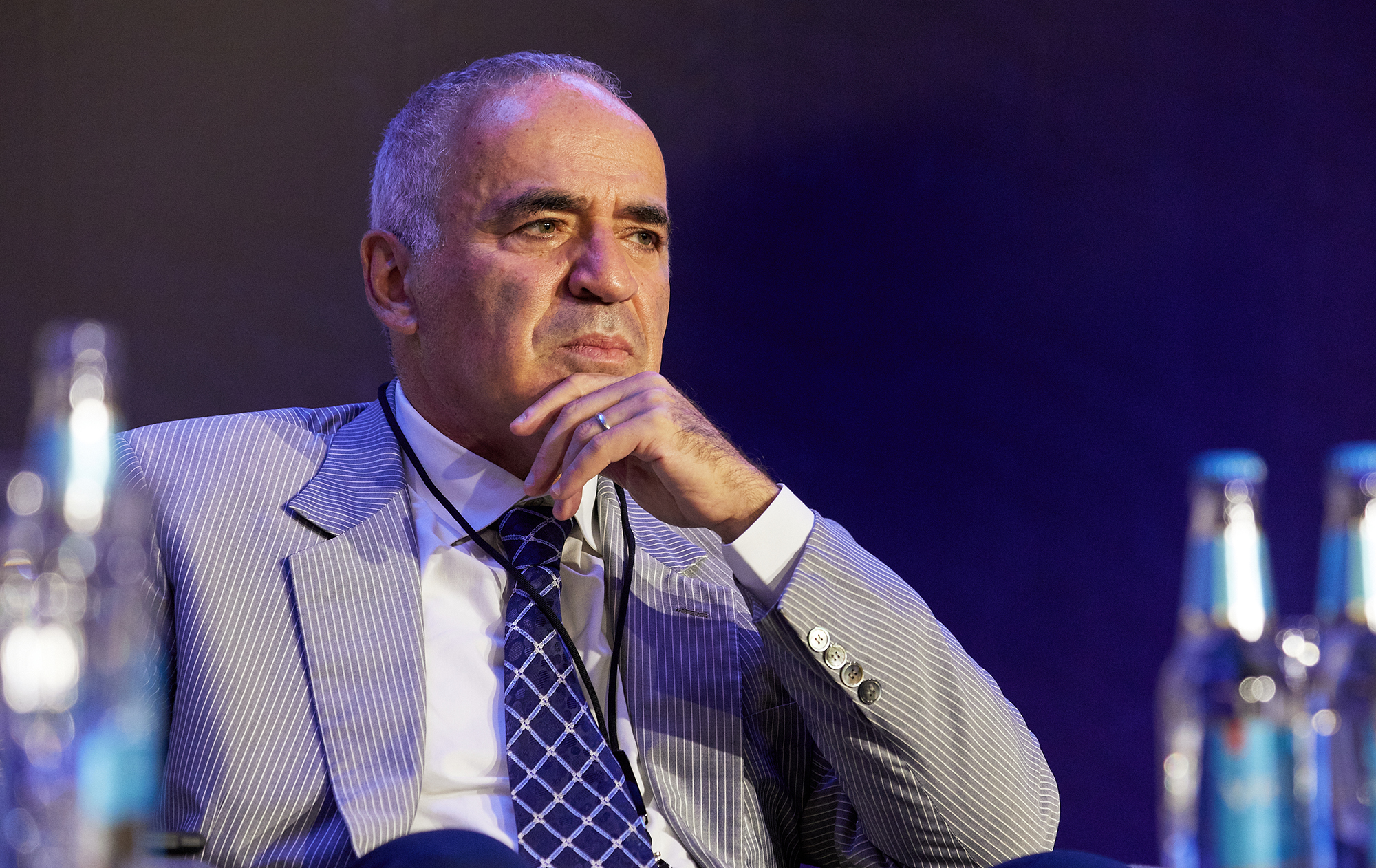
“Putin didn’t conceal his intent to dismantle the Ukrainian state. For eight years, he openly prepared for this move, hoping perhaps that he could achieve it through the Minsk agreements, avoiding a full-blown war. However, when it became evident that the Zelenskyy government was not inclined to surrender and cede control of Ukrainian politics to Putin, he determined that the time had come for a decisive course of action,” he notes.
Comparing Russia and Nazi Germany
In a thought-provoking analysis, Garry Kasparov draws parallels between Russia’s current situation and Germany’s history during the rise of Nazi power. Drawing from historical events, he suggests that 1990 was to Russia the year that 1918 was to Germany. Just as Germany faced defeat due to economic exhaustion and the looming threat of allied forces entering Berlin, Russia, too, found itself at a critical juncture in 1991 after the dissolution of the Soviet Union. Kasparov highlights the harsh parallels between the two moments.
Germany’s post-World War I sentiment is similar to Russia’s present outlook. Kasparov emphasizes that while Germany technically lost the war, its citizens did not perceive it as a true defeat but rather as a result of a conspiracy. This sentiment fueled a desire to restore the nation’s former glory. Similarly, Russia, following the collapse of the USSR, found itself in a similar predicament – the empire’s control mechanism survived despite the geopolitical shifts.
“In my article, I analyzed Umberto Eco’s essay on the 14 features of fascism, if I’m not mistaken, it was in the year 2008. At that time, I had already identified 13 out of the 14 features. In reality, all these components were already present, but what was missing was the most crucial one – Putin’s belief that aggression would enable him to maintain a global status,” notes Kasparov.
In 2008, for instance, Putin was not ready to commit to a full-scale occupation of Georgia. He still harbored concerns about how the West would react to such actions. However, the almost complete absence of a resolute response provided Putin with a sense of impunity.
“In general, by February 2022, Putin was moving methodically. The annexation of Crimea, after all, also yielded no results. The response from the American administration was close to non-existent. It’s important to grasp that all the Western talk about imposing sanctions was rather laughable. From Putin’s vantage point, the West appeared feeble. And any dictator, especially one of a mafia-like disposition, responds to weakness. When he perceives strength, he starts to maneuver. However, when he senses vulnerability, he continues to exert pressure unabated,” the interviewee says.
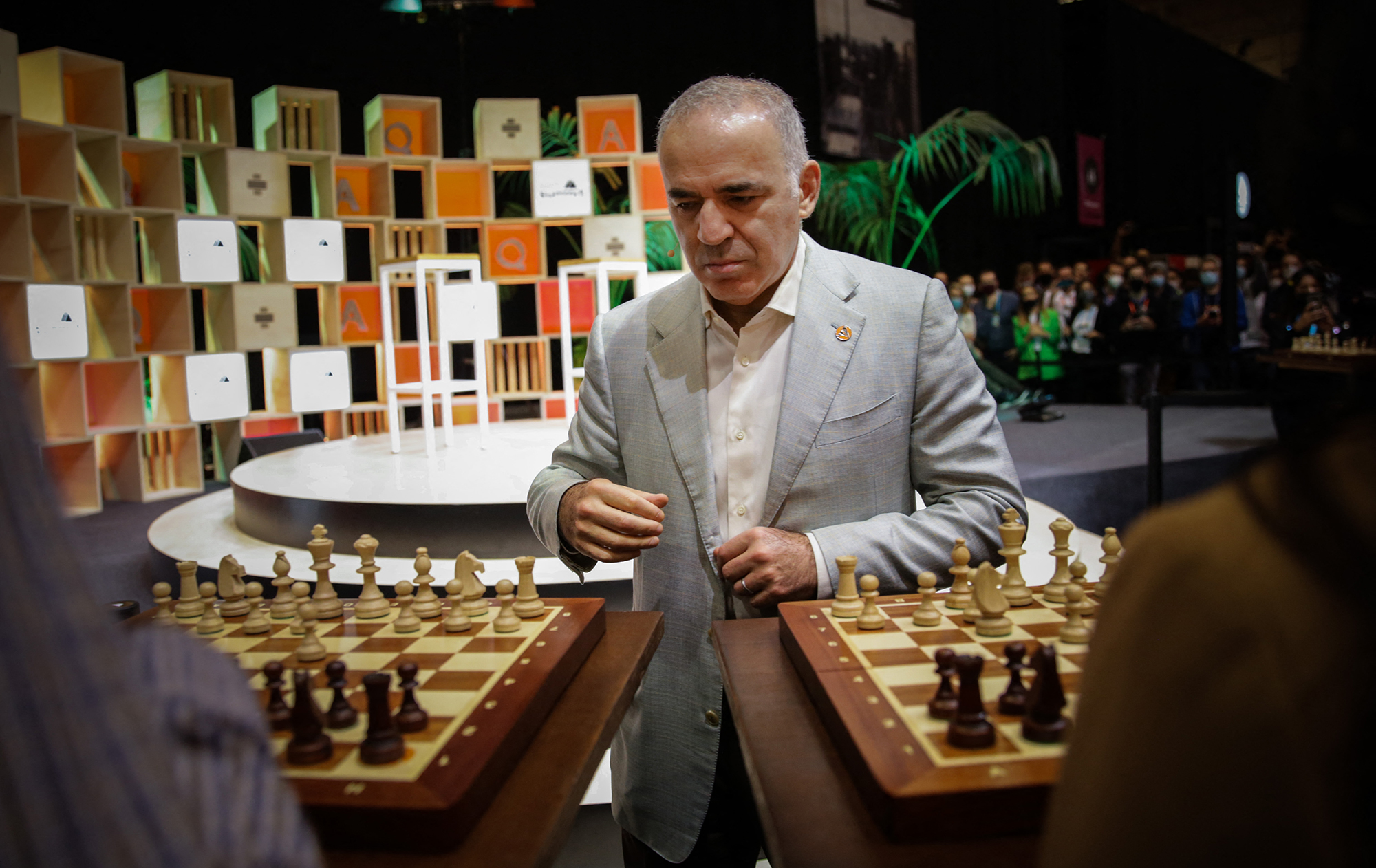
Kasparov believes that had Putin swiftly captured Kyiv as he intended, the West would likely have remained passive. However, Ukraine’s resilience during the initial weeks cultivated alliances that provided support against the aggression.
Another striking parallel between Nazi Germany and Putin’s Russia, according to Kasparov, is the absence of a genuine moral compass within society. He notes that criticism of the war in Russia does not necessarily equate to opposition to the war itself. The prevailing sentiment within Russian society largely refrains from condemning Putin’s expansionist war from a moral standpoint.
Why the majority of Russians remain silent against the war
Amidst the escalating conflict, a critical question arises: why do most Russians remain notably quiet when it comes to opposing the war? According to Garry Kasparov, a mere 10-15% of Russians, roughly 15-20 million people, are vocally against the war on moral grounds. Kasparov attributes this phenomenon to years of mental conditioning and a general indifference toward moral values.
In the initial weeks, Russia did witness demonstrations, with around 200,000 to 250,000 people taking to the streets. Unfortunately, nearly 20,000 of them were detained, and some even faced imprisonment as a consequence of their dissent.
“It’s evident that those who were more courageous participated. This, essentially, accounts for less than one percent. This aligns with the figure of 20 million who expressed sympathy. We comprehend the portion of the Russian population ready to stand against the war, rejecting war as a solution,” explains Kasparov.
Surprisingly, the expected mass mobilization against the war failed to materialize, indicating a growing societal acquiescence to conflict. The Putin regime seems to face no immediate internal challenges to its current support base.
“There exists no alternative route to cleanse the minds of Russian society other than the hoisting of the Ukrainian flag in Sevastopol. If Russia is to have any chance at a meaningful future, it hinges on dismantling the imperialistic notions entrenched within its people’s minds. Only through potent measures can these ideas be eradicated. Nothing short of Ukraine’s complete liberation, symbolized by the Ukrainian flag flying prominently in Sevastopol, can put an end to this imperialistic fervor. This, he believes, would prompt people to contemplate ways to construct a future that doesn’t involve encroaching upon the territories of neighboring nations,” states Kasparov.
Challenges of the Russian opposition
The tepid response from Russian society toward the war underscores the illusory nature of the so-called opposition movements within the country post-2013. Kasparov argues that these groups were effectively co-opted by the regime to prepare for an aggressive war.
Recalling the widespread protests in Russia from 2011 to 2013, Kasparov points out that the majority of participants weren’t aiming to overthrow the regime. They sought concessions from the government, a goal he and a small cadre of fellow activists did not share.
“While we, the radical part of the opposition, believed in toppling the authority, in having no agreements with it, the vast majority within the protests wanted to influence it,” he elaborates.
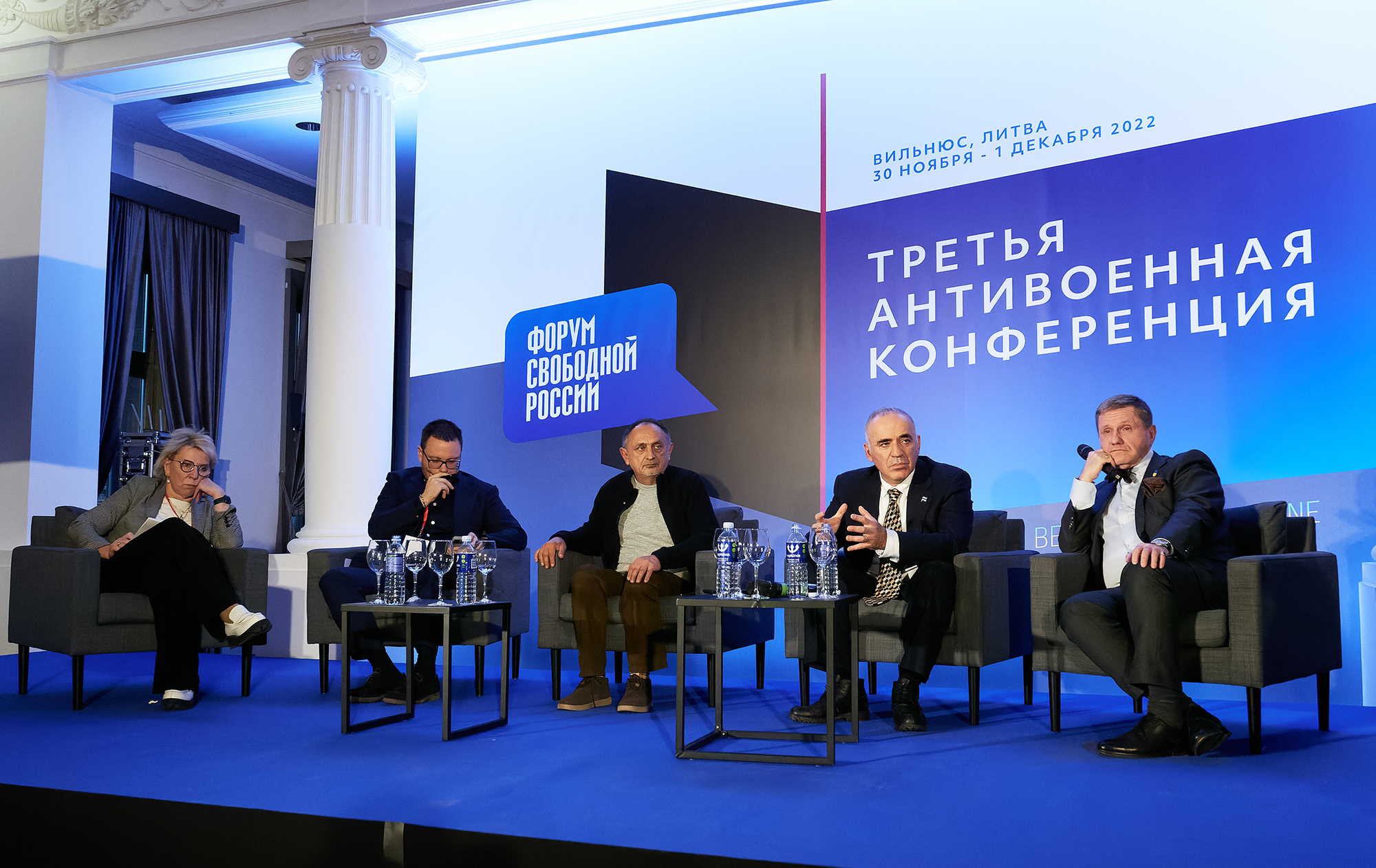
At the end of the day, the government made some concessions but eventually tightened its control. After the Russian Opposition Coordination Council was defeated, Kasparov asserts that it became evident that no political activity in Russia could thrive without the regime’s approval.
“In 2013, my departure, which was harshly criticized by these very audacious “oppositionists” in Russia, was connected not only to the fact that I received a summons from the Investigative Committee, and, in general, it was clear how this would end for me. But also, there were no options for functioning in Russia without the Kremlin’s permission left,” notes Kasparov.
The Free Russia Forum, an opposition organization Kasparov co-founded with like-minded emigrants in 2016, found itself in the minority. Critics accused them of detachment from Russian society, arguing they couldn’t grasp the country’s true conditions from abroad. Even today, this perspective continues to face strong resistance.
“Accusations were made that we’ve grown apart from society, that people perceive things differently now. Indeed, a majority now thinks differently. However, this doesn’t imply that someone claiming moral leadership should unquestionably follow the majority, especially when the majority is wrong,” emphasizes Kasparov.
According to Kasparov, the last Russian politician to oppose the war and Russian imperialism was Boris Nemtsov, who was assassinated in 2015. This, in Kasparov’s view, underscores the regime’s keen awareness of those who threaten it.
“All other opposition figures largely accepted Putin’s imperialistic policies as a given. And at the same time, they spun a narrative in the West that Russia was progressing toward evolution and democracy. The preferred term was “hybrid democracy” in Russia,” the oppositionist says.
The Navalny protests, Kasparov argues, operated within approved boundaries. He underscores that while playing chess if you lack good moves, it doesn’t justify making bad ones.
“Those participating in this imitation of political action, in essence, supported the Kremlin’s line and thus gained the opportunity to function. However, at some point, the regime ceased to require them. The poisoning of Navalny wasn’t a result of him crossing a red line. It’s just that the red line shifted. The regime, at some juncture, ceased to need them,” Kasparov explains.
Many of today’s Russian emigrant opposition members, while benefiting from foreign grants, continue to paint a distorted picture of the situation in Russia. These individuals often resist endorsing a regime change in Putin’s Russia or admitting Crimea’s rightful status as part of Ukraine.
“Reading prominent Russian liberals and opposition figures, one notices statements that Russian patriots should oppose the war. Yet, they cite reasons like ‘because things are going badly,’ ‘because a Ukrainian drone attacked Moscow,’ and ‘because NATO approached the border.’ It’s intriguing and telling that there’s no moral component whatsoever. This, I believe, is a shared trait between Hitler’s Germany and Putin’s Russia – a lack of genuine moral core within society,” concludes Kasparov.
What awaits Russia and Putin after the end of the war
According to Kasparov, Putin will not end the war until he remains in power. His downfall will be the result of Russia’s defeat in the war, he believes.
“Putin’s collapse is inevitable after Ukraine’s liberation precisely because the regime doesn’t hold when the leader loses his legitimacy. And as history shows us, the collapse of a dictatorship in a crumbling empire inevitably leads to the emergence of centrifugal forces. There’s a sequence of moves. The victory of Ukraine isn’t up for discussion. Thus, attempting to tie it (which is what Western politicians are doing) to what will come next is incorrect,” notes Kasparov.
He adds that Russia’s defeat in the war doesn’t necessarily mean its complete collapse. But, in Kasparov’s view, the likelihood of certain territories breaking away from the federation is significant. The West fears this, which could restrain its support for Ukraine.
“Much of this fear of Russia’s uncontrollable disintegration underlies the calculations of American ‘pseudo-politicians’ and Europeans, who are afraid of the subsequent strengthening of China and overall chaos in a country possessing nuclear weapons,” says Kasparov.
He points out that there’s no other way for the war to end besides Ukraine’s victory. Everything else only entails a temporary freeze of the conflict. However, the West has yet to realize this.
“There’s no other way besides Ukraine’s complete victory. Because as long as Putin is in power, he will fight until the last dollar, until the last soldier. And, incidentally, this idea has also infiltrated the minds of most rational Western politicians and even Western society. Therefore, the level of support for Ukraine, if it decreases at all, does so minimally, which contradicts the Kremlin’s calculations. They hope that the West will tire, that someone like Trump will win there, in general, that something will happen,” Kasparov adds.
For Putin, he believes, this is an existential war. Even if he obtains what he wanted and secures a victory, he won’t stop anyway.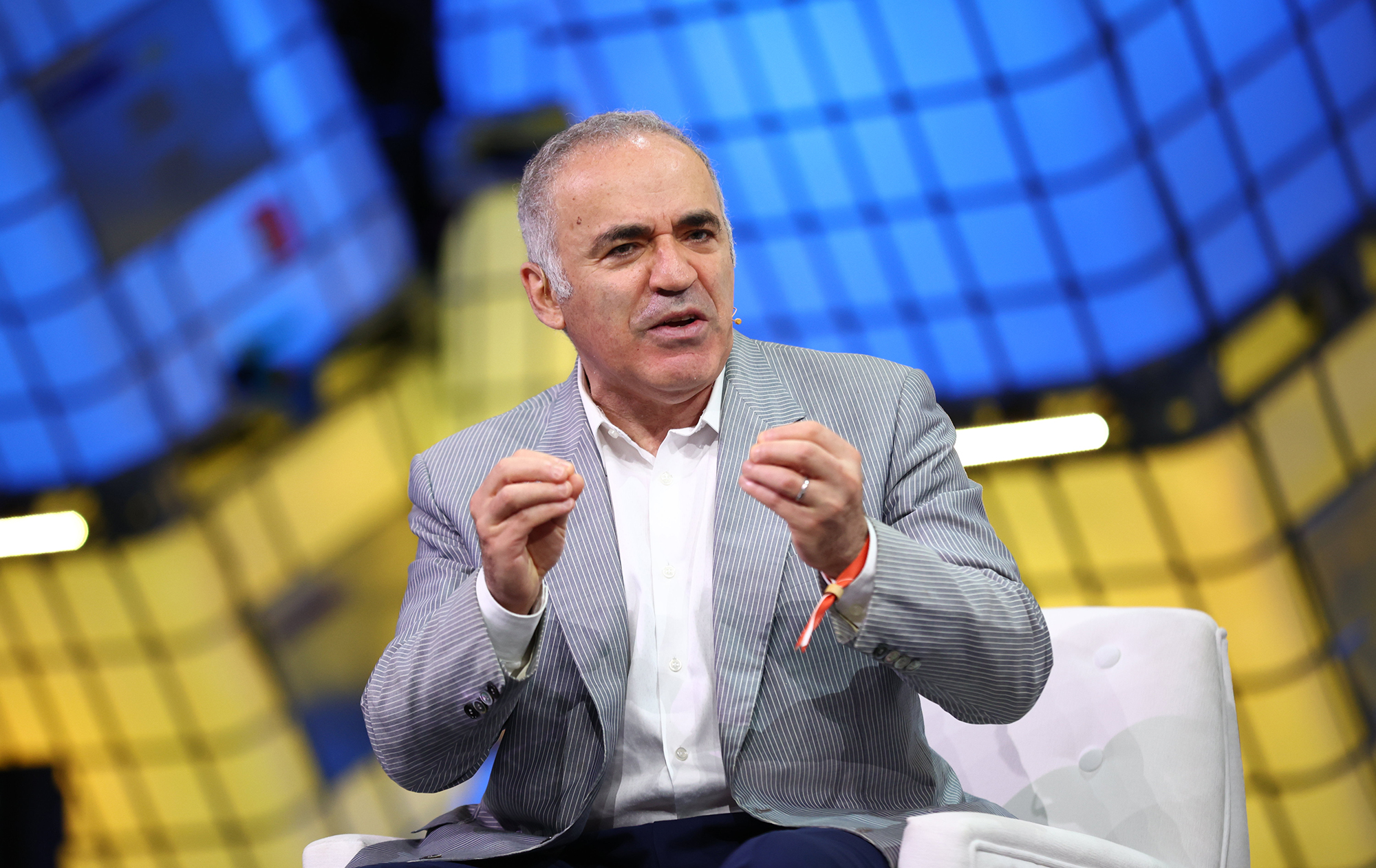 “Beyond that, he will continue the same policy anyway. Eastern Europeans understand that any of Putin’s success in Ukraine means that the Baltic countries will be next. Poles also understand that Putin simply can’t stop because there’s a logic to the development of a dictatorship that will dictate to him the continuation of an aggressive policy,” notes Kasparov.
“Beyond that, he will continue the same policy anyway. Eastern Europeans understand that any of Putin’s success in Ukraine means that the Baltic countries will be next. Poles also understand that Putin simply can’t stop because there’s a logic to the development of a dictatorship that will dictate to him the continuation of an aggressive policy,” notes Kasparov.
He also doubts the possibility of Putin’s overthrow in the foreseeable future. Such a rebellion is possible only when there’s an understanding within the “mafia” ruling Russia that Putin is an unsolvable problem.
“This scenario is theoretically possible, but at present, I think Putin isn’t at the extreme stage for one simple reason. From Putin’s perspective and that of his circle, the outcome of the war is far from obvious,” Kasparov says.
And Prigozhin’s march to Moscow was more likely internal disputes within the mafia than specifically against Putin. The leader of the Wagner PMC felt a threat to his business interests and therefore chose to rebel. However, he likely didn’t act alone, which is why he wasn’t punished for it.
According to Kasparov, the ideal scenario for Russia’s future after the war is the restructuring of the country with an understanding that Tatarstan, Bashkortostan, Chechnya, or any other regions might want to be independent.
“In the best case, it would take a minimum of 2-3 years for the country’s reformatting and convincing a significant part of Russian society that the choice is limited. There are two paths. The first is for some parts of Russia to disintegrate, and others to become Chinese provinces. The second is to try at any cost to redeem guilt and return to the Euro-Atlantic community. It’s not guaranteed to work. But after the disease has spread so deeply, all means should be utilized,” Kasparov reasons.
The concept of Russia’s future restructuring should involve the maximum weakening of the center and the creation of a federal, possibly even confederal, basis for the future state. Additionally, the collapse of the Putin regime should include the liberation of all Ukrainian territories, as well as renouncing any territories that Russia either occupies or influences with unlawful power. Moreover, Moscow should pay reparations and hand over war criminals.
“There can’t be talk of any elective process. It takes several years for society to recover, if possible. This implies creating some coalition structures into which everyone can contribute,” he says.
Kasparov states that he’s ready to work together with other representatives of the Russian Action Committee – Mikhail Khodorkovsky, Sergei Guriev, Sergei Aleksashenko, and others – to help the new Russia integrate into the Euro-Atlantic community in the future. Furthermore, there are certainly talented and educated individuals ready to transform the country among those Russians who were forced into emigration.
“These are the things we’re working on now. Whether it will succeed or not – I don’t know. But it seems to me that everyone should be interested in making Russia’s future somewhat comprehensible. To finally solidify these ‘dragon’s teeth,’ which have repeated throughout Russian history, and try to build something different on this foundation,” Kasparov concludes.”

